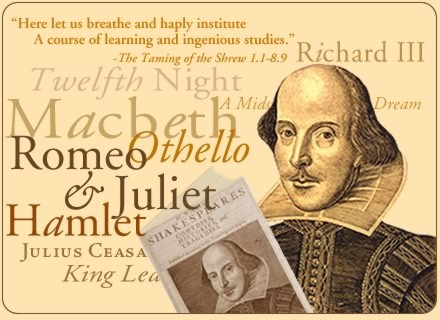"Although we do not have books by William Shakespeare in our library we have had in the past his plays in Graphic Novel format. It is Shakespeare's influence on the English language that is so interesting. Many words and phrases we use today were coined by Shakespeare, many phrases we attribute to Shakespeare we do in error. If you are lucky enough to be taught by Miss Harris, you will learn a little about Shakespeare and if you are in her Drama class you may even perform one of his plays. Last year the drama students performed 'A Midsummer Night's Dream'." Mrs Chin

William Shakespeare
Shakespeare Blogspot
Words Shakespeare Invented
The English language owes a great debt to Shakespeare. He invented over 1700 of our common words by changing nouns into verbs, changing verbs into adjectives, connecting words never before used together, adding prefixes and suffixes, and devising words wholly original. Below is a list of a few of the words Shakespeare coined, hyperlinked to the play and scene from which it comes. When the word appears in multiple plays, the link will take you to the play in which it first appears.
Phrases Shakespeare Invented
Here are some phrases that Shakespeare is said to have invented, many of which are commonly used today.
- "It’s Greek to me" (Julius Caesar) - When you say, "it's Greek to me" you are admitting that you do not know or understand something.
- "Fair play" (The Tempest) - Follow the rules, especially in competitions or sports.
- "All that glitters isn’t gold" (Merchant of Venice) - We usually use this phrase after we discover the fact that something that looks good turns out not to be that great.
- "Wear one’s heart on one’s sleeve" (Othello) - To be a hopeless romantic (or be open and honest about how you feel) is to wear one's heart on one's sleeve.
- "Break the ice" (The Taming of the Shrew) - Often when you meet someone for the first time, you "break the ice" by asking them polite questions about themselves.
- "The lady doth protest too much" (Hamlet) - If someone denies something more than once, you can say "the lady doth protest too much," meaning you think that they feel the opposite to what they are saying.
- "Clothes make the man" (Hamlet) - Although not always true, this phrase implies that how a person dresses tells you something about who they are as a person.
- "A laughing stock" (The Merry Wives of Windsor) - To be a laughing stock is to be considered a joke by many people.
- "Too much of a good thing" (As You Like It) - It is said that "too much of a good thing" (i.e. money, love, food) is not necessarily good for you.
- "In a pickle" (The Tempest) - To be "in a pickle" is to be in trouble or a situation that you cannot easily get out of.
Quotes Mistakenly Attributed to Shakespeare
Oh what a tangled web we weave
When first we practice to deceive. - Sir Walter Scott (Marmion, 1808)
No man is an island. - John Donne (The Bait, 1624)
Come live with me and be my love. - Christopher Marlowe (Passionate Shepherd to his Love, 1599)
For you suffer fools gladly, seeing yourself as wise. - II Corinthians 11:19.
Remember, that time is money. - Benjamin Franklin (Advice to a Young Tradesman, 1748)
For want of a nail, the shoe was lost. - 14th-Century proverb famously recalled in Benjamin Franklin's Poor Richard's Almanack
Music hath charms to soothe the savage breast,
To soften rocks, or bend a knotted oak. - William Congreve (The Mourning Bride, 1.1)
Heaven has no rage like love to hatred turned,
Nor hell a fury like a woman scorned. - William Congreve (The Mourning Bride, 3.8)
I am the master of my fate
I am the captain of my soul. - William Ernest Henley (Invictus, 1875)
How do I love thee? Let me count the ways.
I love thee to the depth and breadth and height
My soul can reach. - Elizabeth Barrett Browning (Sonnets from the Portuguese, 1850)
So farewell hope, and with hope farewell fear,
Farewell remorse: all good to me is lost;
Evil be thou my Good. - John Milton (Paradise Lost, bk.iv,1.108, 1667)
War is the trade of kings. - John Dryden (King Arthur, II.ii, 1691)
It was the best of times; it was the worst of times. -- Charles Dickens (A Tale of Two Cities, 1859)
The law is a ass. -- Charles Dickens (Oliver Twist, 1838)
No comments:
Post a Comment